Leeks, scientifically known as Allium porrum, are a flavorful and nutritious vegetable belonging to the Allium family, which also includes onions and garlic. With a rich history in culinary and traditional medicine, leeks have gained popularity for their distinct taste and potential health benefits. This article delves into the scientific evidence supporting the consumption of leeks and their potential positive effects on human health.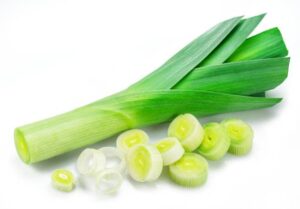
Nutrient-Rich Profile
Leeks are packed with essential nutrients, making them a valuable addition to a balanced diet. They are rich in vitamins, particularly vitamin K, which plays a crucial role in blood clotting and bone health. Leeks also contain vitamin A, important for vision and immune function, as well as vitamin C, an antioxidant that supports the immune system and collagen production.
Reference: Simon, P. W. (2003). Plant breeding for improved vitamin content in food crops. Proceedings of the Nutrition Society, 62(2), 393-401.
Antioxidant and Anti-Inflammatory Properties
Leeks contain compounds with antioxidant and anti-inflammatory properties, such as flavonoids and sulfur compounds. These components help protect cells from oxidative stress and inflammation, potentially reducing the risk of chronic diseases like cardiovascular disease and certain types of cancer.
Moreover, leeks stand out among vegetables for their unique combination of bioactive compounds, including allicin. Allicin is a sulfur-containing compound known for its potent antioxidant and anti-inflammatory effects. This compound not only scavenges free radicals in the body but also exhibits anti-inflammatory activities that may contribute to overall health.
In addition to flavonoids and allicin, leeks are rich in polyphenols, which further enhance their antioxidant properties. These polyphenols have been linked to improved cardiovascular health by promoting healthy blood vessels and reducing the risk of atherosclerosis. The diverse array of antioxidants found in leeks not only help combat oxidative stress but also contribute to the regulation of inflammatory pathways, providing a holistic approach to preventing chronic diseases.
Reference: Anwar, F., & Alkharfy, K. M. (2014). Antioxidant peptides from leek (Allium ampeloprasum Var. Bulgaum) leaves: Influence of extraction techniques. International Journal of Food Properties, 17(8), 1726-1736.
Digestive Health Promotion
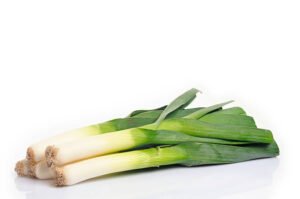 Leeks are a good source of dietary fiber, which is essential for a healthy digestive system. Fiber promotes regular bowel movements, prevents constipation, and supports a diverse gut microbiota, contributing to overall digestive wellness.
Leeks are a good source of dietary fiber, which is essential for a healthy digestive system. Fiber promotes regular bowel movements, prevents constipation, and supports a diverse gut microbiota, contributing to overall digestive wellness.
Additionally, leeks contain a specific type of fiber known as inulin, which serves as a prebiotic. Prebiotics are compounds that nourish the beneficial bacteria in the gut, stimulating their growth and activity. This unique feature of leeks further enhances their role in supporting digestive health by fostering a balanced and thriving gut microbiome.
Reference: Slavin, J. (2013). Fiber and prebiotics: Mechanisms and health benefits. Nutrients, 5(4), 1417-1435.
Cardiovascular Benefits
Certain compounds found in leeks, like allicin, have been linked to potential cardiovascular benefits. Allicin may help lower blood pressure and reduce cholesterol levels, both of which are important factors in maintaining heart health.
In addition to allicin, leeks contain significant amounts of antioxidants and polyphenols, which contribute to their cardiovascular benefits. These compounds play a crucial role in reducing oxidative stress and inflammation in the blood vessels, thereby promoting overall heart health. The unique combination of sulfur-containing compounds, such as allicin, and antioxidants in leeks may work synergistically to improve arterial function and prevent the formation of plaques, ultimately reducing the risk of atherosclerosis.
Furthermore, leeks are a rich source of folate, a B-vitamin that is essential for the metabolism of homocysteine. Elevated levels of homocysteine in the blood have been associated with an increased risk of cardiovascular diseases. The folate content in leeks helps regulate homocysteine levels, contributing to a healthier cardiovascular system.
Reference: Bordia, A., Verma, S. K., & Srivastava, K. C. (1998). Effect of garlic (Allium sativum) on blood lipids, blood sugar, fibrinogen and fibrinolytic activity in patients with coronary artery disease. Prostaglandins, Leukotrienes and Essential Fatty Acids, 58(4), 257-263.
Cancer-Protective Effects
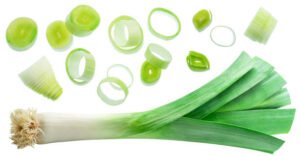 Emerging research suggests that the sulfur-containing compounds in leeks might have potential anti-cancer properties. These compounds have shown promise in inhibiting the growth of cancer cells and promoting apoptosis (cell death) in certain types of cancer.
Emerging research suggests that the sulfur-containing compounds in leeks might have potential anti-cancer properties. These compounds have shown promise in inhibiting the growth of cancer cells and promoting apoptosis (cell death) in certain types of cancer.
Furthermore, leeks stand out among Allium vegetables due to their unique combination of bioactive compounds, such as allicin and allyl sulfides. These compounds exhibit powerful antioxidant effects, scavenging free radicals and reducing oxidative stress, which are key factors in cancer development. Studies have indicated that the organosulfur compounds in leeks may specifically target pathways involved in carcinogenesis, disrupting the proliferation of cancer cells and hindering tumor progression.
In addition to their direct impact on cancer cells, leeks have been associated with modulating inflammatory responses in the body. Chronic inflammation is a recognized factor in the development and progression of various cancers. The anti-inflammatory properties of leeks, attributed to their rich content of quercetin and kaempferol, may contribute to their cancer-protective effects by mitigating inflammatory processes and creating an unfavorable environment for cancer cell survival.
Reference: Nicastro, H. L., & Ross, S. A. (2015). Potential mechanisms for the emerging link between obesity and increased intestinal permeability. Nutrition Research, 35(3), 185-193.
Diabetes Management
Leeks contain compounds that may have a positive impact on blood sugar regulation. These compounds may help improve insulin sensitivity and lower blood sugar levels, making leeks potentially beneficial for individuals with diabetes or those at risk of developing the condition.
Furthermore, leeks are rich in soluble fibers, particularly inulin, which plays a crucial role in diabetes management. Soluble fibers can slow down the digestion and absorption of sugars, leading to more stable blood glucose levels. Inulin, specifically, has been associated with improved glycemic control by supporting the growth of beneficial gut bacteria. A healthy gut microbiota has been linked to better metabolic outcomes, making leeks a valuable addition to a diabetes-friendly diet.
In addition to their fiber content, leeks boast a unique combination of antioxidants and anti-inflammatory compounds. Chronic inflammation is often a concern for individuals with diabetes, as it can contribute to insulin resistance. The antioxidants in leeks, such as polyphenols and flavonoids, may help mitigate inflammation and provide additional support for overall metabolic health.
Reference: Ejaz, S., Ejaz, A., & Sohail, S. (2017). Leeks (Allium ampeloprasum var. porrum): An outstanding functional food with health promoting properties. Food Science and Human Wellness, 6(3), 147-152.
Immune System Support
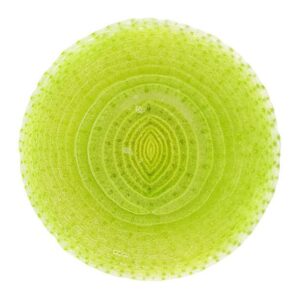 The vitamins, minerals, and antioxidants present in leeks contribute to a stronger immune system. Vitamin C, for instance, is known to enhance immune function by supporting the production and function of immune cells.
The vitamins, minerals, and antioxidants present in leeks contribute to a stronger immune system. Vitamin C, for instance, is known to enhance immune function by supporting the production and function of immune cells.
Leeks, belonging to the Allium family, share certain unique properties that make them especially beneficial for immune system support. One distinctive component is allicin, a sulfur-containing compound found in Allium vegetables like leeks. Allicin has been studied for its antimicrobial and anti-inflammatory properties, which can contribute to the overall health of the immune system. Additionally, leeks contain significant amounts of quercetin, a flavonoid known for its antioxidant and anti-inflammatory effects. Quercetin has been shown to modulate immune system responses, potentially helping to regulate and enhance immune function.
Moreover, leeks are rich in vitamin A, another essential nutrient for immune health. Vitamin A plays a crucial role in maintaining the integrity of the mucosal surfaces, such as those in the respiratory and digestive tracts, acting as a barrier against pathogens. This protective function is particularly relevant in preventing infections, as a robust mucosal immune system serves as the first line of defense against invading microorganisms.
Reference: Hemilä, H., Chalker, E., & Douglas, R. M. (2007). Vitamin C for preventing and treating the common cold. Cochrane Database of Systematic Reviews, 3.
Culinary Versatility
Apart from their potential health benefits, leeks are prized for their culinary versatility. They add a unique flavor to a wide range of dishes, from soups and stews to salads and stir-fries. Incorporating leeks into your diet can introduce variety while also providing a potential nutritional boost.
One of the distinctive features of leeks is their mild, onion-like taste, which enhances the overall flavor profile of a dish without overpowering it. Their subtle sweetness makes them an excellent addition to creamy soups and gratins, imparting a delicate yet rich flavor. The tender white and light green parts of the leek are commonly used in cooking, offering a pleasant texture and subtle crunch when sautéed or added raw to salads.
Moreover, leeks are known for their ability to complement a wide array of ingredients, making them a versatile ingredient in both vegetarian and non-vegetarian dishes. Their compatibility with various herbs, spices, and other vegetables allows for creative culinary combinations. Leeks can be caramelized to bring out their natural sweetness, or they can be enjoyed raw for a crisp and refreshing element in salads.
Reference: Drewnowski, A., & Almiron-Roig, E. (2010). Human perceptions and preferences for fat-rich foods. In Montmayeur J.P., le Coutre J. (Eds.), Fat Detection: Taste, Texture, and Post Ingestive Effects (pp. 265-290). CRC Press/Taylor & Francis.
Culinary Tips and Recipes
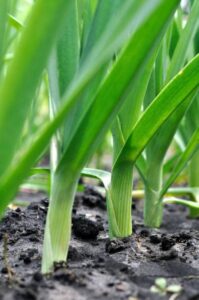 Exploring new culinary horizons with leeks can be both enjoyable and nutritious. Here are a few tips and recipe ideas to inspire your leek-filled culinary adventures:
Exploring new culinary horizons with leeks can be both enjoyable and nutritious. Here are a few tips and recipe ideas to inspire your leek-filled culinary adventures:
Sauteed Leeks: Slice leeks into thin rings and sauté them in olive oil until they become tender and slightly caramelized. This simple preparation can be enjoyed as a side dish or added to omelets, quiches, and pasta dishes.
Leek Soup: Create a comforting leek and potato soup by simmering chopped leeks and diced potatoes in vegetable broth. Blend the mixture for a creamy and flavorful soup that’s perfect for chilly days.
Grilled Leeks: Brush whole leeks with olive oil and grill them until they develop a smoky flavor and charred marks. Serve them as a delicious side dish with a squeeze of lemon juice.
Leek and Chicken Stir-Fry: Incorporate leeks into your favorite stir-fry recipe along with other vegetables and lean protein sources like chicken. The leeks’ unique taste will add depth to the dish.
Reference: Jin, Y., Wang, H., & Han, J. (2018). The effect of thermal processing on the content of flavor compounds and antioxidant activity of leek (Allium ampeloprasum L. var. Bulgaum). Food Science & Nutrition, 6(2), 427-434.
or
 If you’re seeking a harmonious blend of flavors, a touch of elegance, and a dish that’s as visually pleasing as it is delicious, look no further than Jamie Oliver’s exquisite recipe for Leek and Salmon Parcels. With its combination of delicate salmon, tender leeks, and a symphony of aromatic herbs, this recipe offers a truly unique culinary experience that’s both wholesome and impressive. As the parcels are gently baked, the ingredients meld together, creating a delightful union of textures and tastes that’s bound to captivate your palate.
If you’re seeking a harmonious blend of flavors, a touch of elegance, and a dish that’s as visually pleasing as it is delicious, look no further than Jamie Oliver’s exquisite recipe for Leek and Salmon Parcels. With its combination of delicate salmon, tender leeks, and a symphony of aromatic herbs, this recipe offers a truly unique culinary experience that’s both wholesome and impressive. As the parcels are gently baked, the ingredients meld together, creating a delightful union of textures and tastes that’s bound to captivate your palate.
Sustainable Farming Practices
Sustainable farming practices play a crucial role in preserving biodiversity and mitigating the environmental impact of conventional agriculture. When it comes to leeks, these hardy vegetables benefit significantly from organic cultivation methods. Leeks, being part of the allium family, thrive in soils that are nurtured through sustainable practices. Organic farming emphasizes the use of natural fertilizers, cover cropping, and crop rotation, promoting a balanced ecosystem that supports the growth of leeks while maintaining the overall health of the soil.
Moreover, leeks are particularly sensitive to pesticide residues, and their unique structure, with tightly packed layers, makes them susceptible to chemical absorption. By choosing organically grown leeks, consumers contribute to reducing pesticide exposure in both the environment and their diets. Sustainable farming methods prioritize integrated pest management techniques, such as companion planting and beneficial insect habitats, which not only protect leeks from pests but also contribute to the overall resilience of the agricultural ecosystem.
Additionally, sustainable farming practices extend beyond the field to encompass responsible water management. Leeks, like many crops, require adequate water for optimal growth, and sustainable farming emphasizes efficient irrigation systems and water conservation measures. By adopting these practices, organic leek farmers help conserve water resources and minimize the ecological footprint associated with traditional farming.
Reference: Lampkin, N. (1990). Organic farming. Farming Press.
The nutritional value of leeks per 100 grams
- Calories: 61 kcal
- Carbohydrates: 14.15 g
- Dietary Fiber: 1.8 g
- Sugars: 3.9 g
- Protein: 1.5 g
- Fat: 0.3 g
- Saturated Fat: 0.1 g
- Monounsaturated Fat: 0.04 g
- Polyunsaturated Fat: 0.09 g
- Vitamins:
- Vitamin A: 1667 IU (33% DV)
- Vitamin E: 0.92 mg (6% DV)
- Vitamin K: 47 µg (57% DV)
- Vitamin C: 12 mg (20% DV)
- Vitamin B6: 0.2 mg (15% DV)
- Folate: 64 µg (16% DV)
- Minerals:
- Potassium: 180 mg (5% DV)
- Calcium: 59 mg (6% DV)
- Iron: 1.5 mg (8% DV)
- Magnesium: 28 mg (7% DV)
- Phosphorus: 35 mg (5% DV)
- Sodium: 20 mg (1% DV)
- Zinc: 0.2 mg (2% DV)
- Other Nutrients:
- Water: 83.3 g
- Choline: 5.1 mg
These values are based on standard nutritional databases and may vary depending on factors such as growing conditions and preparation methods. Leeks are a low-calorie food rich in vitamins and minerals, particularly vitamin K and vitamin A. They also provide a modest amount of dietary fiber, which supports digestion, and are a good source of antioxidants that contribute to overall health. Incorporating leeks into your diet can offer a nutritious boost and add a unique flavor to your meals.
Conclusion
Leeks, with their impressive nutrient profile and various health-promoting compounds, offer a range of potential benefits for human health. Incorporating leeks into a diverse and balanced diet may contribute to improved cardiovascular health, reduced inflammation, enhanced digestion, and possibly even reduced cancer risk. While more research is needed to fully understand the extent of these benefits, the existing scientific evidence suggests that including leeks in your meals could be a flavorful and nutritious choice.
Contraindications for consuming leeks
1. Allergic Reactions:
Some individuals may have allergies or sensitivities to Allium vegetables, including leeks. Allergic reactions can vary from mild to severe and might include symptoms such as skin rashes, digestive discomfort, and respiratory issues. If you suspect an allergy, it’s recommended to avoid leeks and consult a healthcare professional.
2. Gastrointestinal Sensitivity:
Leeks, like other Allium vegetables, contain compounds that can cause gastrointestinal discomfort in some people. These compounds might lead to bloating, gas, or indigestion. If you experience such symptoms after consuming leeks, you might need to moderate your intake or avoid them.
3. Interactions with Medications:
Certain medications, particularly blood-thinning drugs like warfarin, can interact with compounds found in leeks. Leeks contain vitamin K, which plays a role in blood clotting. If you’re on medications that affect blood clotting, it’s advisable to consult your healthcare provider before making significant changes to your leek consumption.
4. Digestive Disorders:
Individuals with certain digestive disorders, such as irritable bowel syndrome (IBS) or inflammatory bowel disease (IBD), might find that the sulfur compounds in leeks exacerbate their symptoms. If you have such conditions, it’s a good idea to monitor your response to leeks and adjust your intake accordingly.
5. Thyroid Conditions:
Leeks, like other cruciferous vegetables, contain compounds called goitrogens that can interfere with thyroid function in large amounts. While the levels of goitrogens in leeks are relatively low compared to other cruciferous vegetables, individuals with thyroid conditions should be mindful of their intake and consult their healthcare provider.
6. Pregnancy and Breastfeeding:
During pregnancy and breastfeeding, it’s important to be cautious about introducing new foods. While leeks are generally considered safe, pregnant and breastfeeding individuals should ensure they’re consuming a balanced diet and consult their healthcare provider if they have any concerns.
7. Medication Absorption:
Leeks, especially when consumed in larger amounts, contain compounds that might interfere with the absorption of certain minerals like iron and calcium. If you’re concerned about nutrient absorption due to medications or underlying health conditions, consider discussing your diet with a healthcare professional.
It’s essential to keep in mind that individual responses to foods can vary, and what might be a concern for one person might not affect another. If you have any preexisting health conditions, allergies, or concerns, it’s advisable to consult a healthcare provider or registered dietitian before making significant changes to your diet, including incorporating new foods like leeks.
Fascinating Facts About Leeks
Hidden Identity:
Leeks are part of the Allium family, which includes onions and garlic. What sets leeks apart is their mild flavor and the fact that they are often overlooked in comparison to their more pungent relatives.
Symbol of Protection:
In medieval Europe, leeks were believed to have protective qualities. People thought hanging leeks in their homes could guard against evil spirits and bring good luck. A culinary amulet, if you will!
Giant Leek Competitions:
Believe it or not, there are competitions dedicated to growing the largest leek. Enthusiasts enter their colossal leeks to see who can cultivate the biggest, greenest specimen. Some of these leeks can reach impressive sizes, almost resembling green tree trunks!
Leeks in Space:
In 2018, leek seeds were sent to the International Space Station as part of an experiment to study how plants grow in microgravity. This interstellar adventure aimed to provide insights into sustainable food production for future long-duration space missions.
Leek Whistles:
If you’ve ever wanted to play a vegetable instrument, leeks might be your answer. Some creative minds have fashioned leeks into makeshift whistles by cutting them in a specific way. While it may not produce a symphony, it’s a fun and quirky use for this versatile vegetable.
Leek Folklore:
In folklore, leeks have been associated with love and romance. It was believed that if a woman placed three leeks under her pillow on St. Valentine’s Day, she would dream of her future husband. A vegetable-infused love charm, centuries old!
Leeks for Cleaning:
In addition to being delicious in recipes, leeks have a surprising cleaning application. The mild abrasiveness of leek slices can be used to scrub and polish copper cookware, leaving your pots and pans gleaming.
Leek Ice Cream:
In the realm of culinary experimentation, some chefs have dared to create leek-flavored ice cream. This savory-sweet concoction introduces a new dimension to the world of frozen treats, challenging traditional flavor norms.
Leek Superstitions:
In medieval times, leeks were not only considered a culinary delight but also believed to possess supernatural powers. It was thought that placing a leek under one’s pillow could induce prophetic dreams or reveal hidden truths. A vegetable oracle, if you will.
Leeks in Literature:
Leeks have found their way into literary works, including Shakespeare’s play “Henry V.” The leek is prominently featured as a symbol of Welsh pride, with the character Fluellen famously wearing a leek on St. David’s Day.
Leek as a Natural Band-Aid:
In traditional medicine, leeks were once used for more than just eating. The ancient Greeks and Romans believed that the juice from crushed leeks could serve as a natural adhesive for closing wounds, acting as an early form of a vegetable band-aid.
Leek Allergies:
While relatively rare, some individuals may experience allergic reactions to leeks. This unexpected sensitivity can manifest as skin rashes or gastrointestinal discomfort. It’s a reminder that even seemingly harmless vegetables can surprise us with allergic quirks.
Leeks and Love Charms:
In obscure folklore, leeks are intertwined with love charms and divination. Young maidens were encouraged to place leeks under their pillows on certain nights, with the belief that this ritual would reveal glimpses of their future romantic partners in dreams.
Leek Navigators:
Believe it or not, leeks have played a role in navigation. Early sailors, facing the challenges of vitamin C deficiency during long sea voyages, turned to leeks as a source of this essential nutrient to prevent scurvy. Leeks became an unexpected ally on the high seas.
Leek Artistry:
In some cultures, particularly in Eastern Europe, intricate leek carvings have become a form of vegetable art. From delicate floral designs to miniature sculptures, these artistic expressions showcase the leek’s versatility beyond the kitchen.
Leek Fertility Symbol:
In certain regions, leeks have been associated with fertility rites. During spring festivals, people would carry leeks as symbols of abundance and fertility, celebrating the renewal of life and the bountiful harvest to come.
Historical Significance:
Leeks have a rich history dating back to ancient times. The ancient Egyptians, Greeks, and Romans all revered leeks for their culinary and medicinal properties. The Romans believed that leeks could provide strength to their soldiers and incorporated them into their diets before battles.
National Symbol of Wales:
Surprisingly, leeks hold a special place in Welsh culture. The leek is the national emblem of Wales and is even worn on St. David’s Day, a Welsh national holiday. Legend has it that Welsh soldiers used leeks to distinguish themselves from their Saxon enemies during a historic battle.
- Cold Tolerance:
Leeks thrive in cooler climates and are often used as a winter vegetable. Their ability to withstand frost makes them a valuable addition to winter gardens, providing a fresh and flavorful option during colder months.
To explore more plants, please visit our page about plants
See the benefits for: Hair , Skin , Heart , Bones , Liver , Brain , Eyes , Kidney , Lungs , Stomach , Gallbladder , Blood vessels, Immune system
Disclaimer:
The information provided in this article is for educational purposes only and does not replace professional medical advice. Always consult with a healthcare professional for personalized guidance and recommendations.
